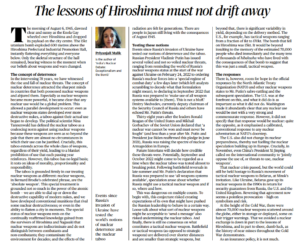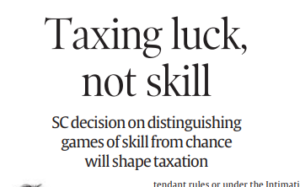The lessons of Hiroshima must not drift away

Introduction
- The dropping of the atomic bomb on Hiroshima in 1945 marked a turning point in the world’s perception of nuclear weapons.
- Over the years, a norm known as the nuclear taboo has evolved, considering nuclear weapons as beyond the pale and justifying their non-use.
- However, recent events, including Russia’s actions in Ukraine, have challenged this taboo and the concept of nuclear deterrence.
The Nuclear Taboo: A Coalescing Norm Against Nuclear Use
- The concept of the nuclear taboo emerged as a non-legal norm against the use of nuclear weapons, grounded in ideas of morality, proportionality, and responsibility.
- The indiscriminate nature of nuclear weapons, their long-lasting environmental effects, and radiation’s intergenerational impact have solidified this taboo.
Testing the Taboo: Russia’s Nuclear Threats
- Events following Russia’s invasion of Ukraine saw Russian leaders issuing veiled nuclear threats, raising concerns about the taboo’s integrity.
- Despite previous pledges against nuclear war, Russia’s rhetoric indicated a willingness to use all available weapon systems, creating uncertainty and speculation about the possibility of tactical nuclear weapons use.
Ambiguity Surrounding Tactical Nuclear Weapons
- The ambiguity surrounding tactical nuclear weapons complicates the situation.
- These weapons have variable yields and are delivered over shorter distances, making it challenging to distinguish them from strategic weapons.
- Misunderstandings about their use risk undermining the nuclear taboo and exacerbating tensions.
Responses by Nuclear Weapons States
- Amidst the nuclear threats, NATO and other nuclear weapons states responded in a way that demonstrated commitment to the nuclear taboo.
- The U.S. clearly stated its strong response to any nuclear use but emphasized a conventional response, not specifying nuclear retaliation.
- China also called for joint opposition to the use or threats of nuclear weapons.
Potential Challenges: Tactical Nuclear Weapons in Belarus
- Belarus’s potential movement of tactical nuclear weapons at Russia’s behest raises concerns about escalating tensions.
- Belarus previously relinquished its nuclear weapons for security guarantees, but the situation now poses risks and symbolic provocations.
Conclusion
The nuclear taboo, rooted in the lessons of Hiroshima and Nagasaki, continues to influence the world’s perception of nuclear weapons.
Recent events have tested the strength of this norm, but the responses of nuclear powers to Russia’s nuclear threats demonstrate a commitment to deterrence without resorting to nuclear use.
The future remains uncertain, and maintaining the nuclear taboo remains essential to prevent catastrophic consequences.
Source: The Hindu
Taxation of Online Gaming and Distinguishing Games of Skill from Games of Chance.

Context
- The Karnataka High Court’s decision in Gameskraft Technologies Private Limited v Directorate General of Goods Services Tax Intelligence raises questions about the taxation of winnings based on chance versus skill.
- Gameskraft Technologies is an online intermediary company that provides platforms for users to play online games against each other.
- The company received a Goods and Services Tax (GST) intimation notice demanding Rs 21,000 crore, challenging it along with other orders of attachment and show cause notices.
The Argument of Gameskraft
- Gameskraft argued that it only provides facilitation services as an online intermediary and does not have any right or claim over the prize money contributed by players.
- The money is held in trust, and the company charges a service fee for its platform, on which GST has already been paid. Hence, there is no supply of goods; the company’s income is merely the service fee.
Taxation of Games in India
- Games of skill are generally not taxed, while games of chance may be taxable. Justice S R Krishna Kumar held that online rummy and other games played on Gameskraft’s platform are not taxable as betting and gambling under the CGST Act.
- The court relied on Supreme Court judgments that exclude games of skill from the category of lottery, betting, and gambling.
Distinction Between Games of Chance and Games of Skill
- The judgment delves into the history of jurisprudence on games of chance and games of skill. Section 65B(15) of the Finance Act, 1994 defines betting or gambling as putting something of value at risk with the hope of gain on the outcome of a game determined by chance or accident. Courts have consistently distinguished between games of chance and games of skill.
- Horse racing, considered a game of skill, has been equated with online gaming in terms of taxation.
Horse Racing and Rummy as Games of Skill
- Courts have ruled that horse racing is a game of skill, as it involves assessing the horses’ form and training, and betting on it is based on astute assessment.
- Similarly, the card game rummy has been recognized as a game of skill, relying on memorization of card patterns and sequences.
- The court extended this protection to online rummy as well.
Challenging the Judgment
The Directorate General of Goods and Services Tax Intelligence has challenged the Karnataka High Court’s judgment before the Supreme Court, and the case awaits further hearings.
Conclusion
The case of Gameskraft Technologies raises crucial questions about the taxation of winnings based on chance and skill.
The Karnataka High Court ruled in favor of the company, considering online rummy and other games on the platform as games of skill, thereby exempting them from GST.
The final outcome of the case will have implications for the taxation of online gaming and could influence how the law treats games of chance and skill in India.
Source: Indian Express

